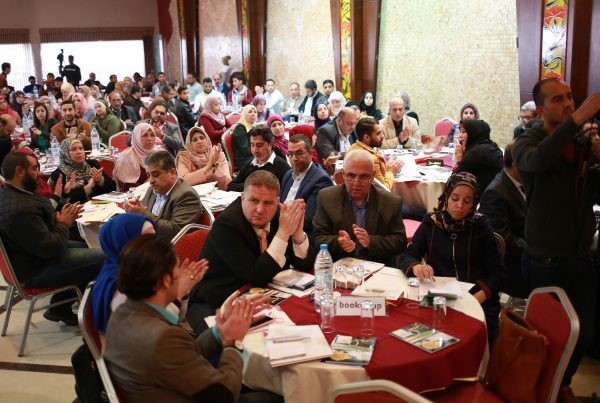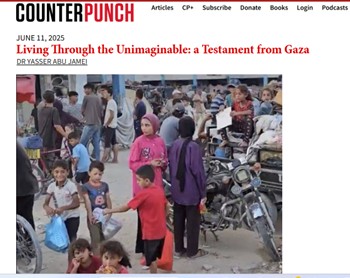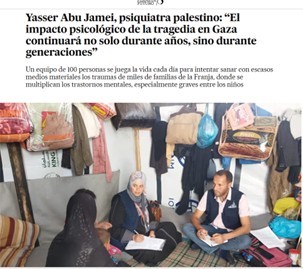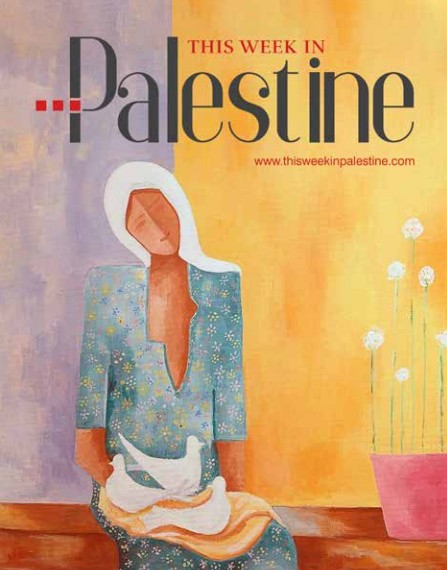
“Gaza Community Mental Health Programme organizes a Workshop entitled “The Realities of Mental Health in Gaza””
Gaza Community Mental Health Programme organizes a Workshop entitled “The Realities of Mental Health in Gaza”
Gaza Community Mental Health Programme (GCMHP) organized a workshop entitled “The Realities of Mental Health in Gaza” with the participation of Dr. Yasser Abu Jamei, Director General of GCMHP, Mr. David Hutton, Head of UNRWA Community Mental Health Program, Dr. Yehia Khader, Director General of Mental Health at the Ministry of Health (MOH), Mr. Essam Younis, Director General of Al- Mezan Center for Human Rights, and Mrs. Reem Freena, Executive Director of Aisha Association for Woman and Child Protection. The workshop was attended by representatives of ministries, governmental and ternational institutions, civil societies, public figures and professionals in the field of mental health.
In the beginning, the workshop started with a speech by Dr. Abu Jamei, in which he presented the difficult living conditions of people in the Gaza Strip as a result of the siege, poverty, unemployment and political division, as well as the consecutive wars by the occupation forces on the Gaza Strip. In addition, the condition of losing hope and fear from the future that the population of Gaza live, and the possibility of witnessing a new war was discussed.
Moreover, Dr. Abu Jamei referred to GCMHP’s figures in 2017, as the most common disorders among newly visiting children seeking GCMHP’s services was bedwetting (20%), followed by post-traumatic stress disorder (13%). Also, he pointed out that (24%) of children suffered from behavioral problems but they did not reach the stages of disorder, and they received the necessary counselling services at GCMHP’s Community Centers.
As for adults, Dr. Abu Jamei pointed that the most common disorders for the new cases in 2017 was depression disorder (22%), disorders related to the use of drugs (21%), and anxiety disorders (26%). Most of the cases, he added, suffered basically from general anxiety disorder and PTSD.
Furthermore, Dr. Abu Jamei highlighted the increase in the levels of fear, anxiety, depression, frustration and addiction among population as a result of the harsh conditions that Palestinians are experiencing. He presented the mental health services provided by the Programme to the Palestinian society, stressing on the Programme’s priorities of developing the capacities of civil society professionals regarding the primary health care in order to improve population mental health conditions in the Gaza Strip. He also emphasized the key issue of enhancing the community’s access to specialized mental health services, building the capacity of professionals and increasing public awareness.
Then, Mr. Hutton presented a paper entitled “Supporting Children and Families In Crises: Building on the Basics of Every Day Life”, in which he explained that the political and economic reality in Palestine has a great impact on the Gazan people. He pointed that 60% of Gazans talk about a poor mental health well-being, he added, (30%) of children in Gaza are in need for psychological support.
In addition, Mr. Hutton presented the psychosocial support programs of UNRWA, as well as the systematic counselling groups, daily life skills classes and their importance for students in providing skills to overcome future difficulties, which would be an important investment for our students’ future. He also praised the School Mediation Intervention (SMI) implemented by GCMHP, as it has a great impact in involving students in the process of solving their own problems. Further, he said that it’s a wonderful program that deals with the student as partners in this program intervention.
After that, Dr. Khader presented a paper entitled “The Reality of Mental Health Services at the Ministry of Heath” in which he talked about the acute shortage of some necessary equipment and drugs to deal with depression, trauma and post-traumatic stress disorder cases.
Moreover, Dr. Khader pointed out that the MOH in the Strip has only one mental health hospital and 6 community centers which provides psychological services. He clarified that the ministry’s services are diverse and complement with the services provided by the partners in these programs.
On his turn, Mr. Younis talked about the unusual ability of the Strip population in adapting the long-standing division, siege, lack of employment opportunities, salary deductions and forced early retirement.
Furthermore, Mr. Younis presented the results of this situation stating that there are more than 100 thousand arrest warrants in Gaza for people who could not pay their debts, and there are 54 patients who died as the occupation refused to grant them permits to travel abroad or go to hospitals in the West Bank and Jerusalem to receive treatment.
Additionally, he presented the impact of the economic and social reality on the aggravating crisis among the Strip inhabitants, stressing on the national reconciliation and social justice to confront crises and address their negative impact.
Finally, Mrs. Freena presented a paper entitled “Reality of Women’s Mental Health in Gaza; Accessibility Problems” in which she highlighted the strong points within the development of services during the last five years, and the use of new techniques for providing psychotherapy such as yoga and aerobics for women. Regarding the weaknesses, she mentioned that they’re related to lack of planning in the specialized centers, hesitation of females visitors to go to the centers due to the stigma, and some other restrictions.
Furthermore, Mrs. Freena stressed on the importance of comprehensive integrating services to improve mental health and social condition for women, especially in the absence of security and international protection in light of the continuation of the Israeli threats. She also talked about cultural restrictions and lack of funding that inhibit provision of services for women. At the end, she recommended the need for integration at services and adopting case management at gender based violence as a key step to achieve mental health for women.
The last part of the workshop included discussion of the presented papers. After that, a group of success stories were presented by specialists working at GCMHP and a specialist from the Islamic Relief.




Read Comments
Steven Rich
March 10, 2019Omnis iste natus error sit voluptatem accusantium nam libero tempore, cum soluta nobis est eligendi optiocumque nihil impedit quo minus id quod maxime.
Van Wimbilton
March 10, 2019Natus error sit voluptatem accusantium nam libero tempore, cum soluta nobis eligendi optio cumque nihil impedit quo minus id quod maxime.